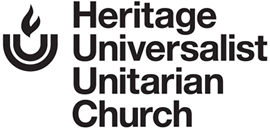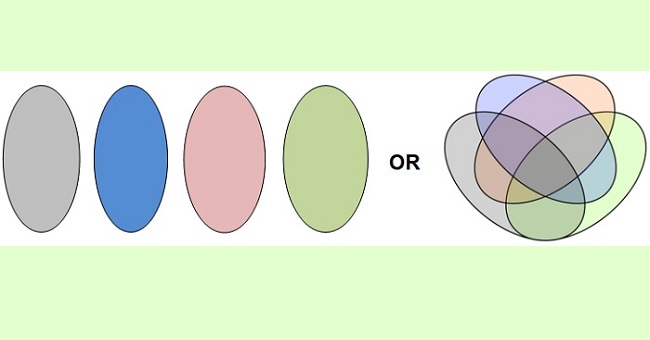Opinion
by Barbara L. Barnes
In today’s fractionalized world, society seems to force us to “identify” with a group. This idea opposes the “come together” ideals that I embraced in my coming-of-age 1970s. Today, such dreams appear politically incorrect. Why must we choose commitment to one side or the other? Few people fit perfectly into any single, simple, stereotypical profile. Are Unitarian Universalists (UUs) falling victim to similar, simplistic, divisive thought/cultural choices, rather than championing ideological diversity?
I identify as a MUTT – Multicultural Underlying Traditions and Taboos. Specifically, I call myself a Norwegian-American, German-American, and Anything-I-Please-American. (I’m not sure of my father’s heritage.) This mixed background provides many advantages. I can choose among my allegiances and desires, while assigning my faults based on stereotypes. I hate hot weather, perhaps from my Norwegian heritage. I’m stubborn, perhaps from my German heritage. I have other flaws that I assign to Dad’s heritage. Why must I identify with only one group? I’m more multi-dimensional than that. My beliefs don’t necessarily fall within one specific mind-set, one stereotype. I see the continuing debates regarding the proposed Article II (Note 1) changes as devolving into simplistic “us vs. them” arguments.
This last summer, I attended a UU workshop on the proposed Eighth Principle (Note 2), a precursor to the proposed Article II changes. I felt compelled to contest a part of a presenter’s oral report on the recent General Assembly (GA). The reporter depicted as racists two candidates for the UUA (Unitarian Universalist Association) Board of Trustees since they questioned adding a new principle. I knew that wasn’t exactly true.
I responded, “I think that you ‘paint with too broad a brush.’” I continued to explain the diverse and juxtaposed opinions of the two candidates. One perhaps presented a bigoted or at least exclusionist attitude; whereas, the other lobbied heavily for additional, civilized discussion of the proposal. I added that I feared that the Eighth’s dictate for “accountability” might lead to uncompassionate and divisive acts or punishments. In immediate response to my comments, another attendee called me a racist, to the group’s silent consent. I was instantly ostracized. When had polite questioning become inappropriate in UU settings, rather than revered? When had denigration become sanctioned? To quote Bob Dylan’s song, “the times, they are a-changin’.”
How can we praise diversity, if we squelch questions or other viewpoints? One application of diversity is empowering people by respecting and appreciating what makes them different. Those differences include perspectives and opinions, supported by both lived experience and empirical data. We should listen to and appreciate all sources of knowledge, not simply dismiss a different view as unfounded or wrong without ample consideration. Free and open-minded communication is key to harmony. Judgment without reflection is stereotyping, which can lead to oppression and/or suppression. A focus of the proposed Article II discusses dismantling oppression. Why battle oppression with oppression in our religious community? This situation only adds a new variation of the same problem – oppression.
I hope the 2023 GA Article II vote motivates delegates to use both their hearts and intellects rather than simply follow a “party philosophy” from either side of the debate. I’m a vacillating centrist, continually educating myself on the issues; seeing the pros and cons of both sides while trusting in delegate enlightenment. I long for a viable compromise.
My hopes center on amendments to the proposed Article II. Our GA delegates will cast preliminary votes on the proposed amendments and Article II modifications this June. Perhaps the proposed amendments will draw us back to a more level keel. Perhaps we can regain our liberal society that respects and values a diversity of thoughts not directed by a political agenda but by individual spiritual devotion bound together by mutual desires.
I fear a splintering of our denomination and congregations as has occurred recently among other religious groups when the “us-vs.-them” mentality became entrenched. Divisive and dividing steps are already afoot in the greater UU world. A single-issue focus harmed other organizations. Let us not join the ranks of the wounded.
Note 1: “Proposed Revision of Article II,” Article II Study Report 2021-2023,” by the Article II Study Commission of the Unitarian Universalist Association, uua.org/files/2023-02/article-II-study-report-2021-23.pdf, report pages 19-22 (PDF pages 21-24).
Note 2: “We, the member congregations of the Unitarian Universalist Association, covenant to affirm and promote: journeying toward spiritual wholeness by working to build a diverse multicultural Beloved Community by our actions that accountably dismantle racism and other oppressions in ourselves and our institutions.” From “The Eighth Principle of Unitarian Universalism,” First Unitarian Universalist Society of Burlington, https://uusociety.org/becoming-a-member/8th-principle/
Image provided by Barb Barnes.

